|
Pivotal World Series Plays
Martin Saves Yankees
1952 World Series - Game 7: New York Yankees @ Brooklyn Dodgers
Bottom of the 7th; Yankees lead the Dodgers 4-2.
Casey Stengel brought in Vic Raschi, his third pitcher of the game and third from his starting rotation following Eddie Lopat and Allie Reynolds. However, Johnny Sain and Ray Scarborough were throwing in the Yankee bullpen. Stengel had to be worried how much Vic had in his tank after pitching 7 2/3 tough innings the day before. Mel Allen, the Yankees' announcer during the season, told the TV audience that Raschi had never been very effective in relief.
RF Carl Furillo walked on five pitches. Southpaw Bob Kuzava replaced Scraborough in the bullpen.
Lefthanded hitting Rocky Nelson stepped in for P Preacher Roe and popped to SS Phil Rizzuto.
3B Billy Cox worked a full count, then singled on a line to right field. Despite running with the pitch, Furillo had to stop at 2B as Bauer, playing shallow, hurried the ball in.
Not sharp, Raschi fell behind Reese 3-1, which brought Stengel to the mound for some words of encouragement. Raschi fired a strike, then finished the base on balls.
Casey called for southpaw Bob Kuzava to face lefthand-hitting CF Duke Snider, the Dodgers' leading hitter in the Series, with the bases loaded and one out.
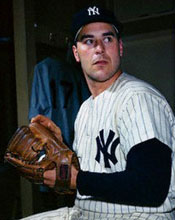 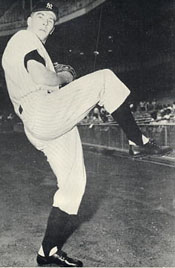 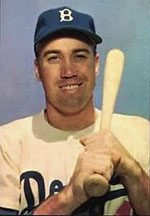 L-R: Vic Raschi, Bob Kuzava, Duke Snider Kuzava, the 29-year-old, 6'2" 200-pounder from Wyandotte MI whose name reminded veteran writer Red Smith of "some kind of melon," had started 12 of his 26 appearances in 1952, compiling an 8-8 record. The Yankee manager probably recalled how Bob got the final three outs in the last game of the '51 Series against the New York Giants. Coming in with the bases loaded and none out and a 4-1 lead, he got two fly balls that scored runs, then retired pinch-hitter Sal Yvars on a line drive that a sliding Bauer caught in RF. That had been Kuzava's only appearance in the '51 Fall Classic. Now Kuzava faced a similar challenge in his only trip to the mound in the '52 series. He later recalled: "I knew Snider a little bit from the International League, and good as he was, I never had trouble with him." However, the lefty later admitted that he said to himself, "This guy (Stengel) has got to be crazy to bring me in here." A called strike, a ball, a check swing foul. Stengel couldn't keep still on the bench, up and down, up and down. The tension mounted even higher with two more balls for a 3-2 count. Snider swung at a rising fastball and popped to 3B Gil McDougald.
Would Stengel change to a righthander to face Robinson? Kuzava himself assumed his manager would replace him with Johnny Sain, a righthander who had battled Jackie many times in the National League. Casey took a few steps toward the mound, then sat back down. His gut told him to stick with Kuzava.
Even C Yogi Berra was testy, arguing the call that made the count 2-1. Jackie hit two straight fouls, ratcheting up the suspense even more. Then Robinson reached out for a curve and hit a little popup over the mound that the wind blew back toward the plate. Kuzava could have made the catch with ease, but this was the major leagues. Pitchers don't go after pop flies. Instead, he called "Joe, Joe" to get 1B Joe Collins to take it. But Joe had lost the ball in the glare pouring through the openings behind the third base stands. With the runner on third already across the plate and the one from second on his way home, it looked for a moment that the ball would drop and pull the Dodgers into a tie. That's when Billy Martin, seeing what was going on, charged in from his second base position, his cap flying off, to grab the ball at knee level just behind the mound.
Showing the best stuff of any Yankee hurler of the afternoon with "his fastball really hopping" as Berra said after the game, Kuzava had wiggled out of the jam to keep the score 4-2.
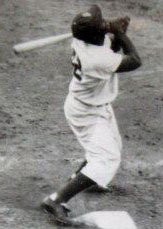 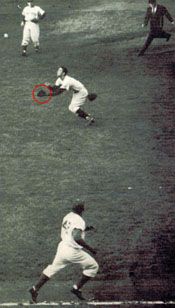 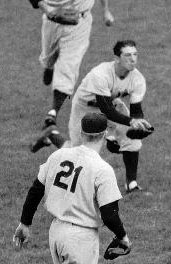 L: Robinson watches his pop up over the mound. C: Jackie watches Martin race for the pop fly. R: Kuzava breathes a sigh of relief as Martin snags the ball. Martin recalled: "It was a three and two count on Robinson, and I played him to pull a little, moving closer to second, and I was almost on the outfield grass. When the ball went up in the air, I looked at Collins, and I saw he had lost it in the sun. We'd been having trouble with the sun all day. I took off. I was worried about the wind because the prevailing wind at Ebbets Field blew the ball toward home plate. Also I was thinking about Yogi. I was afraid he'd be coming out for the ball, and sometimes when he did, he kept his mask on. I heard nothing, no one yelling, no one calling me off the ball. But I knew I might knock into somebody. So when I reached down and grabbed the ball with my glove, I pulled it out and held it in my bare hand. ... I didn't think the play was so much until I got to the dugout and they were all slapping me on the back and saying great play. I was really surprised. But then, when I saw the films of the play, I realized how far I had come." Bob set down the Dodgers in the 8th and 9th to get what would later be called a save–his second straight in a World Series–and give the Yanks the '52 Series title.
|